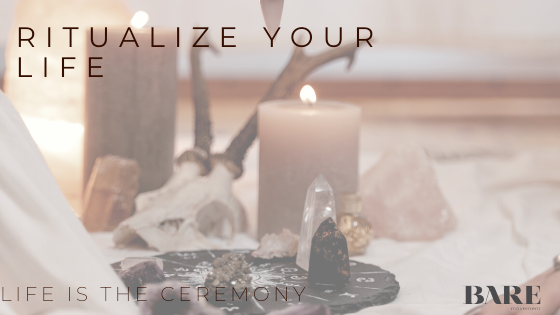"We not only nurture our sacred relationships through ritual, but we are nurtured by them as well. In ritual we move and we are moved."
- Alison Leigh Lily
As a child of immigrant parents I grew up in a seemingly small family (mum, dad, 3 children) but a very large community who celebrated culture, tradition, connection and life. Our traditions seemed wild, colourful, busy and LOUD, and while I adored and loved every part of it, the more I attempted to bring in new friends to this vibrant environment I was shamed and judged for our ethnic ways. I guess it was in this energy that I started pushing away traditions and began the process of unbecoming, exploring, resisting and then the ultimate circling back and deepening my connection to self.
Ritual was never far.
By the tender age of 7 I was already digging holes in the dirt to burry my crystals waiting for the big rains to cleanse and purify, I was creating alters in my bedroom and adorning spaces and my body with pretty things that bought me joy and elevated my mood.
These little "rituals" continued to expand as I began writing poetry and the many dear diary entries, crafted with my bare hands and connected to my body through movement, dance and play.
I was and always remain curious, a student of life and I believe the one thing that continues to pull me through each creative, wild, gruelling and beautiful process is deepening my connection to ritual and ceremony as well as ritualising life. Sharing this with my community, friends, family and clients is where the joy comes in.
It's been through devoting time and energy to learning and acquiring many different modalities, practices, tools and techniques over the past 22 years, along with travel, that I have had the space to step back and observe through the lens of a compassionate witness, one who values growth, culture, expansion, service, self inquiry, heart opening experiences and self love, with a knowing that it's in ritualising my life I've been able to truly value the joy in community, REALationship, connection and more. I now value each tradition my family holds and celebrates along with the many others I have the privilege of witnessing and participating in in life.
What I've come to realise over time as a space sharer and holder is that we overcomplicate the most simple processes and in turn become overwhelmed. Our logical mind over intellectualises leaving us in a space of judgment rather than feeling and embodied experience.
And so my invitation is to lean IN, turn daily habits into self care ritual, cultivate more presence and awareness in your moment by moment movements and simply witness the gentle dissolving of tension as you become lighter, open and more expansive.
What is ritual?
Usually referred to as characteristics of a ceremony or religious life, rituals can be any sincere tradition that includes carefully ordered and well-intended actions.
Examples of modern rituals include yoga and meditation classes and retreats, which are largely unchained from religious beliefs but still foster a sense of spirituality and community.
Any act that you do each day, that’s important to you, can be considered for something to turn into a ritual.
The main elements of ritual
While rituals can be individual they are a beautiful act of devotion that like art can be whatever you wish it to be, however here are some important elements to consider.
- Create your environment | Create Space: A ritual may have an altar, a shrine, incense, offerings etc, but it doesn't have to have any of these. The important thing to consider is what do you want to feel and how will your environment affect your practice. By taking care to create the environment, there is an element of mindfulness and intention that is missing from most of our day to days actions. Decluttering, dusting, creating order in the space can often be enough to set the tone for a devotional practice. An example may be to have flowers, music and sage as you do your yoga, journalling or meditation practice, it may be to have a candle burning while having a shower and turn this into an act of appreciating your body and taking care of it, it could also be prompting yourself throughout the day to take intentional breaths to soothe the nervous system.
- Intention: As you start, set an intention for the ritual. What would you like to practice? How do you want to show up? How do you want to feel? Set the intention, and then carry that throughout the ritual. (This can be as simple as setting an intention to eat your meal in gratitude and presence, or to remove phones from the table as your sit with your family or friends, it could be to set the tone for your breath through your movement practice.)
- Presence: A key part of ritual is to be as fully present as you can. When we intentionally elevate something to ritual, it can increase our presence. (Often having a tool as an anchor such as a candle or palm stone can assist with deep presence)
- Appreciation | Gratitude: Ritual is about bringing full appreciation to the act. They say how we do one thing is how we do ALL things, so weaving in deep appreciation for the seemingly small and simple acts like washing our hands, sipping a hot beverage, eating our meals, moving our bodies, helps to cultivate a deeper sense of appreciation and gratitude for life, the world, others and ourselves.
- Contemplation: Ritual offers space for contemplation. What’s important to you, what brings you closer to your why, your purpose, your fears, what are your aspirations and more. Creating space for ritual allows us to move from our overactive and busy minds into our hearts and reconnect to ourselves in a nourishing and supportive way.
- Make it sacred: To make sacred means to hold your life as an exquisite masterpiece. Each moment blessed with the capability to make your daily doing into the divine space and place of sacred hands by the use of attention, small prayers, ceremony. - Sarah Blondin. The word sacred usually has holy connotations but can simply mean to be devoted to something that has power, a transformative effect. Imagine if we could see the mundane as powerfully sacred and magical?
- Acknowledge and close: In closing your ritual sometimes a simple gesture such as drawing one palm to your heart and one to your belly humbly bowing your head forward in gratitude to the time, space and practice is enough, sometimes you may want to gaze into your reflection in the mirror and acknowledge yourself for showing up, you may also like to acknowledge mother nature, the elements or more, whatever you choose is up to you, it's your sacred practice.
Ritual is a way to elevate and expand what's important to you. Imagine a life of deeper meaning and appreciation and then cultivate that.

